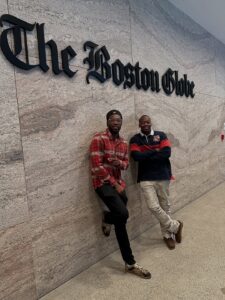In Episode 78 of Show & Tell Boston, health takes center stage as host(s) welcome two powerhouse voices in the fight against chronic illness: Dr. Shecia Paul (aka Chia), a Certified Diabetes Care and Education Specialist at Boston Medical Center, and Abayomi Munro (Aba), the Healthy Living Director at the Roxbury YMCA.
Together, they unpack the realities of diabetes and hypertension—two conditions that disproportionately impact Black and brown communities—and offer clear, compassionate guidance for prevention and management.
The episode kicks off with a breakdown of what diabetes and hypertension truly are. Diabetes is marked by excess sugar in the blood, while hypertension refers to persistently high blood pressure. Chia explains how Type 1 diabetes is autoimmune (the body doesn’t produce insulin), whereas Type 2 stems from insulin resistance. Many Americans, she warns, are stuck in the “pre-diabetes” phase (A1C between 5.7–6.4) without knowing they’re on the brink.
Early detection is crucial, and tools like the ADA’s 60-second risk test and simple A1C checks at your primary care provider can make a world of difference. Symptoms like frequent urination, vision changes, or unexplained weight loss shouldn’t be ignored.
Both Chia and Aba stress that these health issues can’t be separated from community impact. “Black and brown people are nearly twice as likely to face these conditions,” Chia says, citing a mix of genetic, environmental, and socioeconomic factors.
Instead of preaching restriction, they advocate for culturally sensitive, sustainable solutions. “You don’t have to give up your favorite cultural dishes,” Aba insists. “We teach people how to adapt them in healthier ways.”
That includes label reading, understanding carb pairing, and even small daily movements—like taking the stairs or dancing at home. Aba recommends 150 minutes of moderate exercise per week, but reassures listeners that 10-minute walks count, too.
The YMCA’s year-long Diabetes Prevention Program is at the heart of Aba’s mission. With weekly group sessions, free gym access, childcare, and nutritional education, the program fosters long-term accountability.
It’s not just about workouts—it’s about reading food labels, controlling portions, and learning to love healthy habits in a judgment-free space.
One standout moment from the episode is a story about a patient whose A1C dropped from a dangerous 17.7% to under 7% in less than a year—without insulin—just by modifying her lifestyle.
The discussion also addresses the use—and misuse—of trendy diabetes drugs like Ozempic, Trulicity, and Mounjaro. Chia warns about people using these without medical need, reminding listeners these medications are intended for real patients with complex conditions.
They also confront the emotional side of health journeys: “Most people fall off after one slip-up,” Aba notes. “But success comes from bouncing back—not being perfect.” Motivation, they say, must come from within and be rooted in community support.
Final Takeaways
- Avoid sugary drinks. Hydrate with water.
- Pair carbs with protein and fiber.
- Shop smart using food pantries or farmers markets.
- Move daily—even light activity matters.
- Recognize progress, not perfection.
Where to Get Help
- YMCA of Greater Boston: ymcaboston.org | 617-427-5353
- Boston Medical Center – Endocrinology Department: Offers multilingual diabetes education covered by most insurance providers.
In a time when chronic illness looms large, Show & Tell Boston delivers a powerful message: community-based, culturally grounded health solutions can truly change lives.












